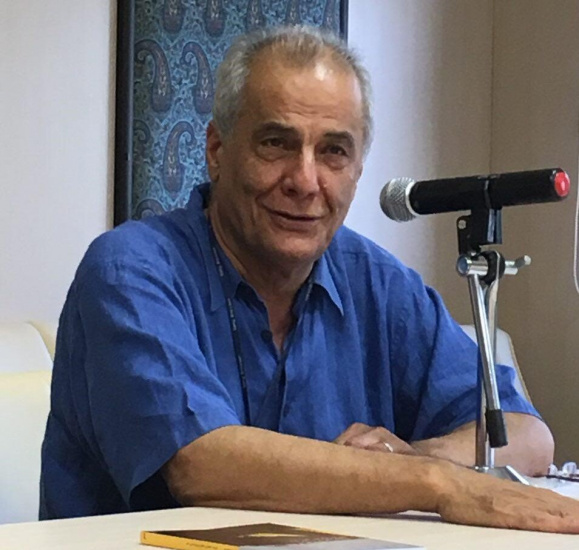Healthy economy is antidote to sanctions on Iran: scholar

A prominent scholar, believes that fighting corruption and building a healthy foundation for economy are catalysts to resist sanctions and external pressure on Iran.
“What is important is to adopt policies to have a foundation of a healthy economy in order to be able to counter external pressure,” Modjtaba Sadria told the Tehran Times in an interview on Thursday.
Sadria, an expert on East Asia, cited China and its resistance against the U.S. sanctions as an example.
China has adopted clear and coherent policies which resulted in a “strong foundation for national economy” and also a very “strong social base” to counter the U.S. pressure, Sadria explained.
“Between 1848 (opium war) and 1949 (Chinese revolution), a deep desire of independence grew in China. Xi Jinping [the Chinese president] has undertaken huge program of economic transformation of China in order not to depend on Chinese trade with the United States,” he explained.
He said that the U.S. pressure is not tolerated in China.
Referring to China’s act in suspending purchases of U.S. agricultural products, Sadria said, “This is one of the examples of Chinese tools to retaliate the Trump administration’s show of force to China.”
China announced on Tuesday that it has suspended purchases of U.S. agricultural products in retaliation for a “serious violation” of agreements between President Xi Jinping and his counterpart Donald Trump.
Sadria said, “On the sidelines of a G20 summit in Osaka, Japan, Trump and Xi met and reached agreement on reducing sanctions by the U.S. However, Trump restored those sanctions. These actions which are unilateralism in the international relations are not tolerated by China. Trump cannot use sanctions as bargaining tools against a country which is the second largest economy in the world.”
“Today, China is a society to which you cannot show off power with the game of sanctions,” he added.
He also said that the U.S. has not any leverage to impose sanctions on other countries unilaterally and act as the “lone superpower”.
“When China takes retaliatory action against the U.S. unilateralism and pressure, it affects not only the U.S. economy, but the whole global economy,” he pointed out.
He noted that China has adopted policies in line with the growth of its national economy that the U.S. cannot harm it by imposing sanctions or exerting pressure.
Trump and Xi held a summit during the G20 in Osaka, Japan in June.
Xinhua reported that the two leaders had agreed to resume economic and trade negotiations, and that the U.S. said it would not impose any new tariffs on Chinese products.
However, Trump announced last week that the U.S. would put a new 10 percent tariff on $300 billion worth of imports from China.
China “has not ruled out import tariffs on U.S. agricultural products purchased after August 3, and related Chinese companies have suspended purchasing U.S. agricultural products,” Xinhua said.
American Farm Bureau Federation President Zippy Duvall said in a statement issued after news of China’s retaliatory measures, “China’s announcement that it will not buy any agricultural products from the United States is a body blow to thousands of farmers and ranchers who are already struggling to get by.”
‘U.S. move to form coalition in Persian Gulf is show of bargaining strategy’
Sadria also said that the U.S. move to form a maritime coalition in the Persian Gulf is a “show of bargaining strategy rather than execution of threats” and is not based on realities in the world.
“Washington is trying to apply its bargaining policies against Iran and form a coalition like it created against Iraq in 2003,” he said.
He added that under the current global economic situation major powers are in crisis, therefore the U.S. does not have the power to make them join the coalition.
“In 2003, other countries had the [financial] resources and the U.S. had the power to extract those resources in order to form a coalition against Iraq. Today, the other countries do not have the resources because they are on the edge of crisis and the U.S. is not powerful enough to extract the resources,” he opined.
He noted, “So, the U.S. efforts to form alliance in the Persian Gulf is more a show of a bargaining strategy which cannot pose a threat against Iran.”
Commenting on the UK’s participation in the U.S. Persian Gulf mission, Sadria said that Britain is in a very fragile situation and seeks to gain Washington’s support.
The U.S. has announced plans to form a Washington-led maritime force to supposedly secure the Strait of Hormuz in the Persian Gulf, which hosts considerable international oil shipments.
German Foreign Minister Heiko Maas said in a press conference on July 31 that his country “would not participate in the mission the United States plans to form.”
A German government spokeswoman also said on August 5 that Chancellor Angela Merkel and the whole German government do not see Germany taking part in a U.S-led naval mission in the Strait of Hormuz.
“The chancellor does not see a participation in a U.S-led mission in the current situation and at the current time - everyone in the German government agrees on that,” a government spokeswoman told a news conference, according to Reuters.
Madrid and Tokyo have also rejected an official request from Washington to participate in the naval coalition.
Spanish newspaper El Confidencial said on August 1, Madrid had received an official request from the United States to participate in these forces. However, the same sources said that “the Spanish government has currently no intention to participate in joint U.S.-led forces,” Middle East Monitor reported.
Japan’s Mainichi Shimbun also reported that Tokyo won’t send ships to join the U.S.-led maritime force.
The UK announced on August 5 that the Royal Navy will join the coalition.
Source: Tehran Times

